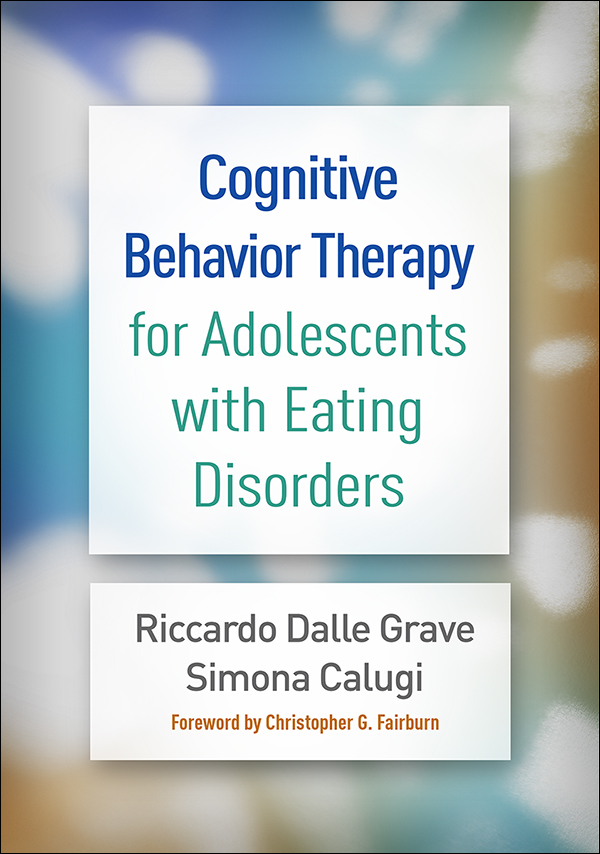Il libro che descrive la terapia cognitivo comportale migliorata (CBT-E) per gli adolescenti con disturbi dell'alimentazione sviluppata dall'equipe di Villa Garda e raccomandata dalle linee guida NICE

Dalle Grave, R., Calugi, S. (2020). Cognitive Behavior Therapy for Adolescents with Eating Disorders. New York: Guilford Press
This state-of-the-art guide provides a powerful transdiagnostic approach for treating adolescent eating disorders (anorexia nervosa, bulimia nervosa, binge-eating disorder, and others) in either outpatient or inpatient settings. It describes how enhanced cognitive behavior therapy (CBT-E)—the gold-standard treatment for adult eating disorders—has been systematically adapted and tested with younger patients. With a strong motivational focus, CBT-E gives the adolescent a key role in decision making. The book presents session-by-session guidelines for assessing patients, determining whether CBT-E is appropriate, developing case conceptualizations, conducting individualized interventions, addressing medical issues, and involving parents. User-friendly features include case vignettes and reproducible forms; purchasers get access to a Web page where they can download and print the reproducible materials in a convenient 8½" x 11" size.
CBT-E is recognized as a best practice for the treatment of adolescent eating disorders by the U.K. National Institute for Health and Care Excellence (NICE).
Reviews
“This is an important book. It fills two major gaps. For clinicians, it provides a detailed guide to the treatment of any form of eating disorder seen in adolescents. For researchers, it specifies for the first time how this empirically supported treatment, 'enhanced cognitive behavior therapy' (CBT-E), should be implemented with young patients....Too often, treatment manuals are written by treatment 'gurus' or researchers who engage in little or no ongoing face-to-face clinical work....This book is entirely different, as it has been written by two experienced practitioners, both of whom are active clinically. The result is a truly useful guide.”![]()
—from the Foreword by Christopher G. Fairburn, DM, FMedSci, FRCPsych, Wellcome Principal Research Fellow and Professor of Psychiatry, University of Oxford, United Kingdom
“Eating and weight issues in adolescence can be disabling and can have lifetime effects. Written by two outstanding clinician-scholars, this very accessible book shows how to deliver empirically based, state-of-the-art treatment that is tailored to the individual. With thoughtfulness and care, the authors capture the complexities of describing eating disorders in adolescents and discuss ways to navigate the thorny issues of patient and family engagement. An important book.”![]()
—Kelly D. Brownell, PhD, Robert L. Flowers Professor of Public Policy and Professor of Psychology and Neuroscience, Duke University
“Dalle Grave and Calugi, two respected CBT experts, have produced a vital manual that walks the clinician through engaging and treating adolescents with eating disorders. This is a well-written book that describes how to deliver CBT-E to younger patients in a flexible, individualized, and effective manner. An indispensable resource for clinicians and supervisors, the volume provides clear, practical guidance rooted in emerging scientific evidence.”![]()
—Carlos M. Grilo, PhD, Director, Yale Program for Obesity, Weight, and Eating Research, Yale University School of Medicine
“Treating adolescents with eating disorders remains a significant challenge, in part because few treatments have garnered efficacy data that promote confidence in their application. With this detailed, comprehensive treatment manual, Dalle Grave and Calugi take the field a significant step forward. These authors have been at the forefront of the development of a transdiagnostic application of CBT-E for adolescent eating disorders, and this manual will be a most valuable tool for clinicians as well as clinical researchers.”![]()
—Daniel Le Grange, PhD, Benioff UCSF Professor in Children’s Health, Department of Psychiatry, University of California, San Francisco; Emeritus Professor of Psychiatry and Behavioral Neuroscience, The University of Chicago


